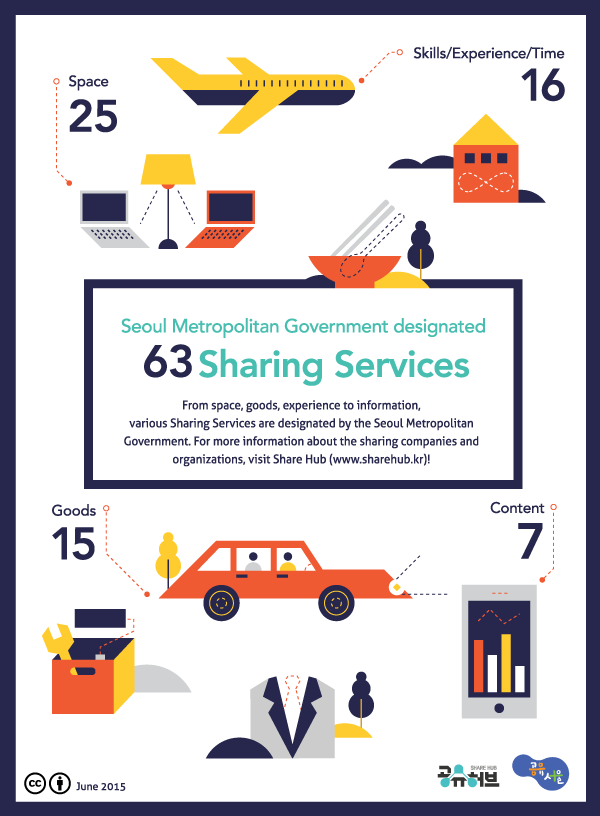Sharing City Seoul
Seoul – capital of South Korea, a gleaming metropolis set in Asia, a modern city, and now, with government initiatives, Asia’s first sharing city.
Let’s look at why Seoul has seen the need to become a sharing city.
Seoul declared itself as sharing city
 Their Sharing City Initiative defines itself by stating its overall vision as a “city that solves urban problems by facilitating people to share idle products, time, information and space”.
Their Sharing City Initiative defines itself by stating its overall vision as a “city that solves urban problems by facilitating people to share idle products, time, information and space”.
Why does Seoul need sharing though? The constraints of living in an urban metropolis has changed the living environments and landscape over the years, putting constraints on both natural and human resources, such as space, leading to the need to utilize resources as efficiently as possible.
To understand why Seoul needs sharing in the first place, let’s look at the history of Korea, Seoul, and the Korean people.
“Sharing is the way of life
for sustainable tomorrow”
South Korea is a very traditional country, and a very traditional Asian society that focuses on the family as a core societal unit, with elders and age being venerated and respected, and it is also a very patriarchal society as a whole.
South Korea came out of their war with North Korea devastated with few natural resources and an enemy at the border. After which, rapid industrialization and modernization followed by years of growth marked it as one of the four Asian tigers.
“The youth were particularly affected by the increased inequality”
In this rapid period of growth, the traditionally closeted and conservative chaebols (Korean: 재벌), or family businesses dominated the economy, and as years passed, higher costs of living, increased income inequality and slowed growth has led to an modern urban metropolis with a lack in community spirit.
The youth were particularly affected, as the lack of growth and job opportunities has affected their ability to live in bigger cities like Seoul.
The purpose of this sharing initiative then, is two-fold.
- To make cities more affordable and liveable for everyone,
- To foster a sense of community lost in an urban metropolis, to make a place to feel at home with friends.
It is not possible to keep bloating the public sector with more jobs to achieve this, nor is it possible in the capitalistic model to keep exploiting and utilizing already overstretched and shrinking finite resources such as space.
“The idea behind the sharing city is to utilize existing facilities, resources with new practices centred around trust”
However, this isn’t going to be free bonanza of sharing – it is a pragmatic approach to the constraints of the city. It is a pragmatic approach to a very real problem, of more tourists, having less places to stay, less people having places to stay, not enough parking lots, not enough books and crayons for needy children; the list goes on.
Over 60 Sharing Services are encouraged by the government in Seoul:

Tourists – the city is actively encouraging tourists to stay at local B&B’s or rent empty rooms within a house for their stay in Seoul. As with the lack of apartments to stay in – the cost of living has a factor to play in this as well as trust. In a very economy driven city like Seoul, most times, apartments stand empty not because there are no landlords leasing the out, it is because prices are too high.
Businesses – the aim of the project is to allow organizations and entities also to participate in the project, with a motivational sum of a 9 million Won ($7,700* USD) project grant, as long as the organization or entity has its service activities in the city of Seoul.
The city also goes further by listing several areas and laws that need to be acted upon that prohibit or make the sharing economy harder to operate.
Transportation – Article 81 of Passenger Transport Service Act, eases the ban on the usage of private vehicles for commercial public transport! This is easy to understand, since the popularity of ride sharing services is well know, as is the alleviation of traffic congestion due to the lowered number of cars on the road.
Taxation – Article 50 of the Restriction of Special Local Taxation Act, to exempt taxes on religious organizations when they share facilities with the public. This is interesting, especially since it could promote social cohesion and dialogue between different generations and sub-cultures within Korean society.
Food Industry – Article 37 of the Food Sanitation Act eases regulations when dealing with restaurants who share their space with the public.
As for the other areas, they call for new regulations in the areas of Insurance and Construction, with Insurance being vague, and construction calling for the use of sharing practices in the design of new buildings.
It remains to be seen if the Korean government at large will be able to implement these practices and actions quickly enough to cope with the changing urban landscape and societal attitudes. However, the proposals and measured outlined in their document bears hope for a better, more sharing, and caring Seoul.
*KRW to USD rate as of May 7, 2016



